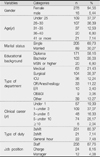Abstract
Purpose
This study conducted to identify the effect of learning organization construction and learning orientation on organizational effectiveness among hospital nurses.
Method
Data was collected from convenient sample of 296 nurses who worked for the major hospitals in Seoul, Gyeonggi-do and Gangwoen-do. The self-reported questionnaire was used to assess the general characteristics, the level of the learning organization construction, learning orientation and organizational effectiveness. The data were analyzed using descriptive statistics, pearson's correlation coefficient and multiple regression.
Figures and Tables
Table 2
Level of learning organization construction, learning orientation, organizational effectiveness (n=294)

References
1. Cho KD. The effects of organizational learning behavior on organizational effectiveness of a hospital employees. 2000. Seoul: University of Kyung Hee;Unpublished master's thesis.
2. Champbell KP, Bonas DA, Bwteron NG, Dunette MD. The management of organizational effectiveness: A review of the relevant research and opinion, personnel R&D center Report. 1974. San Diego:
3. Choi JH. Influence of organizaional structure and organizational culture on organizational learning among hospital employees. Unpublished doctoral dissertation. 2007. Pusan: University of Inje.
4. Farrell MA. Antecedents and consequences of a learning orientation. Mark Bull. 1999. 10:38–51.
6. Garvin DA. Building a learning organization. Harv Bus Rev. 1993. 71(4):78–91.
7. Gilley JW, Maycunich A. Organizational learning, performance and change: An introduction to strategic human resource development. 2000. Pereseus Publishing.
8. Hurt TH, Teigen CW. The development of a measure of perceived organizational innovativeness. Commun Yearb. 1977. 1(1):377–385.

9. Jeong SH. The effect of learning organization on organizational effectiveness in nurse. 2003. Seoul: University of Yonsei;Unpublished doctoral dissertation.
10. Kim EJ, Lim JY, Lee HI. A study on MBTI personality type and learning organization. J Korean Acad Nurs Adm. 2005. 11(3):265–273.
11. Kim EA, Lim JY, Kim EJ, Lee HI. An Analysis of learning organization affecting on organizational commitment - According to MBTI personality type -. J Korean Acad Nurs Adm. 2007. 13(1):24–31.
12. Kim SG, Chae MS. An empirical study on the impact of the strategic human resource development on organization effectiveness -Focusing on intemediating effect of learning organization-. J Hum Resour Manag Res. 2008. 15(4):21–55.
13. Lee J, Kim M. An study on te relationships between organizational culture and organizational effectiveness-Focusing on moderating effects of leadership. Korean J Hum Resour Dev. 2009. 12(2):32–49.
14. Lee SH, Cho WH, Nam JH. Relationship between the development levels of learning organization and organization effectiveness in hospital. Korean J Health Policy Adm. 2005. 15(3):1–16.

15. McGoldrick J, Stewart J. Stewart J, McGoldrick J, editors. The HRM-HRD nexus. 1996.
16. Mott PE. The characteristics of effectiveness organizations. 1972. New York: Harper & Row.
17. Nam JH. A study on the effectiveness of learning organization managed by medical center. 2003. Seoul: University of Yonsei;Unpublished doctoral dissertation.
18. Niven P. Balanced scorecard: Step-by-step: Maximizing performance and maintaining results. 2002. New York: John Wiley & Sons, Inc..
19. Norton P, Kaplan S. The balanced Scorecard-measures that drive performance. Harv Bus Rev. 1992. 70(1):71–79.
20. Park YB, Park HK. A study on the effect of the learning organization on organizational performance and the moderating effect of contingent variables. J Korean Acad Organ Manag. 2003. 27(2):83–109.
21. Pedler M, Burgoyne J, Boydell T. The learning company. 1992. Maidegead: MacGraw-Hill.
22. Senge PM. The fifth discipline: The art and practice of the learning organization. 1990. New York: Doubleday/Currency.
23. Sinkula JM, Baker W, Noordewier TG. A framework for market-based organizational learning: Linking values, knowledge and behavior. J Acad Mark Sci. 1997. 25:305–318.

24. Yu YM. Organization as a learning system. 1994. The Korean Society for Educational Technology.




 PDF
PDF ePub
ePub Citation
Citation Print
Print







 XML Download
XML Download